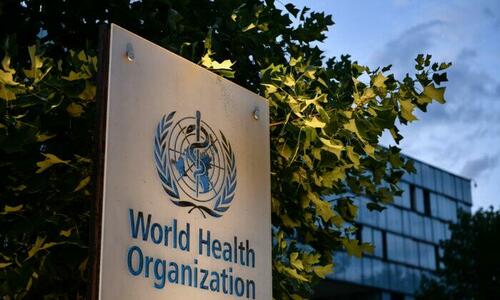
Authored by Kevin Stocklin via The Epoch Times (emphasis ours),
As member states of the World Health Organization (WHO) prepare to gather in Switzerland next week to negotiate final terms of an accord that will give the WHO centralized authority over U.S. policy in the case of a pandemic, Republican senators are pushing back with an effort to reinforce congressional power to authorize treaties.

The draft accord, which would be “legally binding” on all 194 member nations, gives the WHO the authority to declare pandemics and submits member countries to “the central role of the WHO as the directing and coordinating authority on international health work,” in areas like lockdowns, treatments, medical supply chains, surveillance, and “disinformation and false news,” once a pandemic is declared.
Seventeen U.S. senators, led by Ron Johnson (R-Wis.), introduced the “No WHO Pandemic Preparedness Treaty Without Senate Approval Act” on Feb 15, which states that the pandemic accord must be deemed a treaty, thus requiring the consent of a supermajority of the Senate, which is two-thirds, or 67 senators. The legislation comes as the WHO gears up to present what it calls the “zero draft” of the accord, negotiated with the help of U.S. Health and Human Services Secretary Xavier Becerra, to all member nations on Feb. 27 to agree final terms.
Other sponsors of the bill included Chuck Grassley (R-Iowa), Bill Hagerty (R-Tenn.), John Barrasso (R-Wyo.), Mike Lee (R-Utah), Marsha Blackburn (R-Tenn.), Rick Scott (R-Fla.), John Hoeven (R-N.D.), Marco Rubio (R-Fla.), Ted Cruz (R-Texas), Steve Daines (R-Mont.), Thom Tillis (R-N.C.), Tom Cotton (R-Ark.), Mike Braun (R-Ind.), Tommy Tuberville (R-Ala.), Roger Marshall (R-Kan.), and Katie Britt (R-Ala.).
“The WHO, along with our federal health agencies, failed miserably in their response to COVID-19,” Sen. Johnson stated. “This failure should not be rewarded with a new international treaty that would increase the WHO’s power at the expense of American sovereignty.”
But some doubt this bill, even if approved, will stop the WHO accord from going into effect once President Joe Biden signs it.
“With all due respect to the sponsoring senators, that will not do the trick,” Francis Boyle, professor of international law at Illinois University, told The Epoch Times. The reason, he said, is that the WHO accord is drafted specifically to circumvent the Senate-approval process, and Congress instead should immediately withhold its yearly contributions to the WHO and take the United States out of the organization.
Currently, the United States is the largest contributor to the WHO’s $6.72 billion budget, of which $1.25 billion is for “health emergencies.” The Bill and Melinda Gates Foundation is the second largest donor to the WHO, contributing 9 percent of its budget in 2021; China is the third.
Will Biden Need Senate Approval for WHO Accord?
It remains unclear if the Biden administration will need Senate approval for the WHO accord to go into effect. The accord itself states that it will become effective and legally binding on member states “provisionally,” as soon as it is signed and before any national legislatures approve it.
“The Biden administration can indicate that it is provisionally bringing this treaty into force upon the mere signature of the treaty,” Boyle said. “Hence, it will come into force here in the United States provisionally until the Senate decides whether or not it is going to give its advice and consent to the treaty. I personally know of no other U.S. treaty that provides for its provisional application pending the U.S. Senate giving its advice and consent to the treaty.”
Read more here...
Authored by Kevin Stocklin via The Epoch Times (emphasis ours),
As member states of the World Health Organization (WHO) prepare to gather in Switzerland next week to negotiate final terms of an accord that will give the WHO centralized authority over U.S. policy in the case of a pandemic, Republican senators are pushing back with an effort to reinforce congressional power to authorize treaties.

The draft accord, which would be “legally binding” on all 194 member nations, gives the WHO the authority to declare pandemics and submits member countries to “the central role of the WHO as the directing and coordinating authority on international health work,” in areas like lockdowns, treatments, medical supply chains, surveillance, and “disinformation and false news,” once a pandemic is declared.
Seventeen U.S. senators, led by Ron Johnson (R-Wis.), introduced the “No WHO Pandemic Preparedness Treaty Without Senate Approval Act” on Feb 15, which states that the pandemic accord must be deemed a treaty, thus requiring the consent of a supermajority of the Senate, which is two-thirds, or 67 senators. The legislation comes as the WHO gears up to present what it calls the “zero draft” of the accord, negotiated with the help of U.S. Health and Human Services Secretary Xavier Becerra, to all member nations on Feb. 27 to agree final terms.
Other sponsors of the bill included Chuck Grassley (R-Iowa), Bill Hagerty (R-Tenn.), John Barrasso (R-Wyo.), Mike Lee (R-Utah), Marsha Blackburn (R-Tenn.), Rick Scott (R-Fla.), John Hoeven (R-N.D.), Marco Rubio (R-Fla.), Ted Cruz (R-Texas), Steve Daines (R-Mont.), Thom Tillis (R-N.C.), Tom Cotton (R-Ark.), Mike Braun (R-Ind.), Tommy Tuberville (R-Ala.), Roger Marshall (R-Kan.), and Katie Britt (R-Ala.).
“The WHO, along with our federal health agencies, failed miserably in their response to COVID-19,” Sen. Johnson stated. “This failure should not be rewarded with a new international treaty that would increase the WHO’s power at the expense of American sovereignty.”
But some doubt this bill, even if approved, will stop the WHO accord from going into effect once President Joe Biden signs it.
“With all due respect to the sponsoring senators, that will not do the trick,” Francis Boyle, professor of international law at Illinois University, told The Epoch Times. The reason, he said, is that the WHO accord is drafted specifically to circumvent the Senate-approval process, and Congress instead should immediately withhold its yearly contributions to the WHO and take the United States out of the organization.
Currently, the United States is the largest contributor to the WHO’s $6.72 billion budget, of which $1.25 billion is for “health emergencies.” The Bill and Melinda Gates Foundation is the second largest donor to the WHO, contributing 9 percent of its budget in 2021; China is the third.
Will Biden Need Senate Approval for WHO Accord?
It remains unclear if the Biden administration will need Senate approval for the WHO accord to go into effect. The accord itself states that it will become effective and legally binding on member states “provisionally,” as soon as it is signed and before any national legislatures approve it.
“The Biden administration can indicate that it is provisionally bringing this treaty into force upon the mere signature of the treaty,” Boyle said. “Hence, it will come into force here in the United States provisionally until the Senate decides whether or not it is going to give its advice and consent to the treaty. I personally know of no other U.S. treaty that provides for its provisional application pending the U.S. Senate giving its advice and consent to the treaty.”
Read more here…
Loading…






